In Japanese, boku 僕 means multiple things. Normally, boku means "I" or "me," as a first person pronoun used mostly by boys. It can also mean "boy," as a way to call out a young boy. Originally, it referred to male servants. It's also spelled boku ボク and boku ぼく.
Meaning
Originally, boku was a self-deprecating way for male servants to refer to themselves.(日本国語大辞典)
- geboku
下僕
Manservant.- A word that includes the boku morpheme with its original meaning.
- shimobe
下僕
In Japanese culture, self-deprecation is understood as humility, and it's the sort of thing servants are expected to do to present themselves in front of their superiors.
The 僕 kanji was read yatsugare やつがれ in the Heian 平安 period (794–1185), which was a Japanese reading (kun'yomi 訓読み). In the Edo 江戸 period (1603–1868), it began being read as boku ボク, its Chinese reading (on'yomi 音読み), and being used toward people of equal or lower status. Nowadays, it's used mostly by young boys.(日本国語大辞典)
First Person Pronoun
The word boku translates to "I" or "me" depending on whether it's the subject or object of the clause.
- boku wa Tarou desu
僕は太郎です
I'm Tarou. - boku ni oshiete
僕に教えて
Teach [it] to me.
Tell me about [it].- oshiete - te-form of oshieru 教える, "to teach."
Often you don't need to explicitly use a first person pronoun, so just Tarou desu and oshiete would have the same meaning as the phrases above.
See first person pronouns for details on grammar.
The phrase boku no 僕の means "my" or "mine."
See also: no の particle.
- boku no namae wa Tarou desu
僕の名前は太郎です
My name is Tarou. - sore wa boku no desu
それは僕のです
That is mine.
The phrases boku-ra 僕ら or boku-tachi 僕たち mean "we" or "us."
See also: tachi 達 pluralizing suffix.
- boku-ra wa ningen desu
僕らは人間です
We are human. - boku-tachi wa ningen desu
僕たちは人間です - boku-ra wo shinjite
僕らを信じて
Believe us. - Bokurano
ぼくらの
Ours. (title of a sci-fi manga and anime.)
Plural
The plural of boku is either boku-ra or boku-tachi. Both phrases are very common. For reference, some data:
| ~ra | ~tachi | |||
|---|---|---|---|---|
| ら | 等 | たち | 達 | |
| ぼく | 1030 | 2 | 1149 | 32 |
| ボク | 66 | 0 | 64 | 11 |
| 僕 | 924 | 56 | 983 | 197 |
Nuances
It's complicated, but the nuances of boku can be summarized as:
- It's normally used by children, young boys, but it can also be used by adults and girls.
- It can be used in respectful contexts, e.g. when talking to one's teacher.
- It's sometimes viewed as not as manly as other masculine pronouns.
- In anime, characters that use boku range from timid, cowardly weaklings, to quiet, cool, or calm types.
- It's also a hint that a character has lived a sheltered live, possibly raised by a rich family.
The word boku is one of the most common Japanese masculine first person pronouns, but it's not the only one, nor is it the most common.
- In a pool, 59% of 396 adult men claimed to use ore 俺 in private, with friends and family, 22% claimed to use boku, 6% claimed to use jibun 自分, and another 6% claimed to use watashi 私.(mynavi.jp)
vs. 俺
There are multiple differences between boku and ore.
In general, masculine words sound strong, assertive, and rude, arrogant even. In order to sound polite in Japanese, you can't be assertive, you have to sound submissive, which is associated with feminine language.
This is the case with ore and watashi.
Men normally use ore in casual contexts, talking with their male friends, most of whom use ore, their girlfriends, and so on.
Conversely, in formal, business contexts, when talking to clients, you don't use ore, you'd typically use watashi. Some do use ore when talking to coworkers and subordinates, but not to one's superiors.
The word boku 僕 is an exception to the rule above. Despite being masculine, its origins are rooted in servitude. It's a humble word by itself. Therefore, it doesn't come off as strong and assertive, but as meek and nonthreatening instead.
- Men who use ore say it sounds manly, while boku sounds childish. Meanwhile, men who use boku say boku sounds gentle, while ore sounds arrogant.(mynavi.jp)
- Context: Miyamizu Mitsuha 宮水三葉, who is a girl, switches bodies with Tachibana Taki 立花瀧, who is a boy. Upon meeting Taki's school friends, she has trouble figuring out the appropriate first person pronoun to use as a boy.
- a... watashi
あ…私
Ah... I... - watashi?
私?
"Watashi?"- His friends look puzzled.
- watakushi?
わたくし?
"Watakushi"?- Nope.
- iya boku...
いや 僕…
Erm... "boku"?
- Nope.
- ee...?
ええ…?
Eeh...?- Hang in there, Mitsuha!
- ore....?
俺…?
"Ore"?- *nods*
- Context: Gojou Satoru 五条悟, who doesn't like to obey rules, is told to obey societal norms.
- ichininshou "ore" wa {yameta} hou ga ii
一人称「俺」はやめた方がいい
[It] would be better if {[you] stopped} [using] the first person pronoun "ore."- ore - a masculine first person pronoun that's not used in formal situations.
- a´?
あ゙?
Ah?
- What did you just say to me???
- toku ni {me-ue no} hito no mae dewa ne
特に目上の人の前ではね
Specially in front of [your] superiors, [alright].- {me-ue no} hito
目上の人
People [who] {are above you}.
[Your] superiors.
- {me-ue no} hito
- {Tengen-sama ni au kamoshirenai} wake dashi
天元様に会うかもしれないわけだし
{[We] might meet Tengen-sama}, [after all].- In this series, Tengen-sama is an important person, as hinted by the fact the ~sama suffix is used with their name.
- "watashi", saitei demo "boku" ni shi na
「私」最低でも「僕」にしな
Use "watashi," at very minimum "boku," [okay].
- Context: a monster presents himself a nonthreatening way.
- *"ijimenaide kure yo~.
boku wa warui suraimu janai yo.
*「いじめないでくれよー。
ボクは わるいスライムじゃないよ。
pls no bully,
I'm not a bad slime.- ijimeru
いじめる
To pick on. To bully. To be cruel to.
- ijimeru
Romantically speaking, some women may consider men that use ore to sound more manly that those that use boku.
The reason for this is basically that Japanese first person pronouns work much like nouns: if I say "that man over there," we know he's a "man," but if I say "that servant over there," we only know it's someone of low status.
Although not exactly the same thing, ore refers to oneself as a man, while boku does not. Despite both being used by men, only ore carries the connotation of: yes, I'm talking about a MAN: me.
In contexts that demand respect, using ore would be disrespectful, as it may sound arrogant.
- When talking to one's teacher, you wouldn't use ore, but you may use boku instead.
That said, boku isn't actually a formal word, so in some contexts one may prefer to use something more proper instead.
- Context: Ken'ichi greets a martial arts master.
- koko da! yahari Miu-san wa {koko e ike} to itta-n-da!!
ここだ!やはり美海さんはここへ行けと言ったんだ!!
[It] is here! [As I thought], Miu-san told [me] {to go here}!! - a, ano... boku... iya, jibun wa Shirahama Ken'ichi desu!
あ、あの・・・ボク・・・いや、自分は白浜兼一です!
E, erm... I(boku), [I mean], I(jibun) am Shirahama Ken'ichi.- jibun - a pronoun typically associated with military officers, police officers, detectives, and the sort of profession that demands strict conduct and knowing one's place in a hierarchy.
- Fuurinji-san no shoukai de kimashita. yoroshiku onegai shimasu!
風林寺さんの紹介で来ました。よろしくお願いします!
[I] came by Fuurinji-san's invitation. [I'll be in your care]!- yoroshiku onegai shimasu - expression used when introducing yourself, take good care of me, I'll be in your care, pleased to meet you, etc.
- peko
ペコ
*bows* - houhou, {wakai} noni aisatsu ga shikkari shitoru no.
ほおほお、若いのに挨拶がしっかりしとるの。
Ho ho, despite {young} [you] greet properly. (literally.)- i.e. you know your manners for someone of your age.
There are also cases that vary from person to person.
- Some men use ore with their friends, but boku with their family.
- In Bakuman バクマン, the protagonist uses ore with his best friend, and boku when talking to his own mother.
- In GIntama 銀魂, Okita Sougo 沖田総悟, a sadistic psychopathic cop, uses ore normally, but basically changes personality in front of his sister, including using boku in front of her.
- Some men use ore with male friends, but boku in front of women.(mynavi.jp)
Besides the above, it's mostly a matter of personal preference.
Since most men use ore in private contexts, the idea that a man would use ore instead of boku if they felt comfortable is prevalent. This can lead to two situations.
First, that a man using boku or another pronoun with you means he doesn't consider your relationship with him to be intimate enough for him to use ore.
- Context: a hypothetical, romantic situation.
- {{zutto "watashi" wo tsukatte-ita} dansei ga, futo "ore" wo tsukatta} koto ni dokitto shita
ずっと「私」を使っていた男性が、ふと「俺」を使ったことにドキッとした(mynavi.jp)
[My heart skipped a beat] in reaction to {a guy [that] {always used watashi} suddenly using ore}}.- dokitto suru
ドキっとする
To do a doki. (literally.)
To skip a heart beat.- A doki ドキ is a *thump* of the heart, so literally "to do a thump," "to make a thump."
- dokitto suru
Second, and conversely, if he uses ore with you, that means he thinks you're his buddy, and maybe you don't think you're his buddy, and you'd rather he stopped acting like you're buddies, when you're clearly not.
Usage by Young Boys
The word boku is typically used by young boys.
- Context: a young boy asks a squid girl for help with his studies.
- jaa Ika-neechan, boku ni sansuu oshiete yo!
じゃあイカ姉ちゃん ボクに算数教えてよ!
Then, Ika-neechan, teach me arithmetic!- neechan - older sister, may also be used toward young women whom one's not related to, specially used by children toward any girl older than them.
- betsu ni ii degeso yo
別にいいでゲソよ
[I don't mind doing it].
Very young children, like 3 years old and younger, will use their own names instead of personal pronouns.
Afterwards, boys will use either ore or boku. At such age, children are extremely impressionable, so which pronoun a boy ends up using will be influenced mostly by which pronoun he sees used more.
For example, which pronoun his friends use, his older brother uses, his father uses, his favorite anime character uses, and so on.
In casual contexts, most adult men, and teenagers, will use ore.
Younger boys will see this and try to mimic it. They think older boys look cool and they want to look cool too, mimic everything the older boys do, including swearing, smoking, drinking alcohol, boxing, and, in this case, using ore.
Their parents, however, won't like that. For them, ore is a pronoun men use, and their little boy isn't a man yet, so he shouldn't use ore, he should use boku instead.
As boys grow up, this nuance between the two pronouns becomes clear to them, and they eventually switch from boku to ore permanently when they feel like they're adult enough.
When these things happen exactly varies from person to person, environment to environment.
For example, say a boy's first first person pronoun is ore. If his parents are bothered by it, he might be forced to use boku instead. If his parents don't care about it, he'll just keep using ore all the time.
Conversely, a boy's first first person pronoun may be boku, and he might just never switch to ore. Just keep using boku his whole life. That's valid, too.
Usage by Adult Men
Although boku is typically associated with its usage by young boys, some adult men use boku, too.
- boku wa Raion
僕はライオン
I'm Lion. - goku futsuu no sarariiman desu
ごく普通のサラリーマンです
[I'm] a very normal salaryman. - gyaa' raion kowaiiiaaaaa
ギャーッライオン怖いいいあああああ
*shriek* a lion, scaryyyyyyaaahhh.
As mentioned previously, there are mainly two reasons for this.
First, men that use ore in private, when they feel comfortable, with their friends, and switch to boku depending on whom they're talking with, e.g. their superiors, their family, in front of women, etc.
And second, men that use boku all the time, because they feel most comfortable with that pronoun, probably because their self-image is too gentle to use ore. This is the case of Lion above, a very calm, gentle, unassertive sort of character, that wouldn't use the assertive pronoun ore.
Usage by Girls
Some girls use boku as personal pronoun. They're known as:
- bokukko
ボクっ娘, or 僕っ娘, ボクっ子, 僕っ娘
"Boku girl." A girl that uses boku. - boku-shoujo
ボク少女, or 僕少女
- Context: Kousaka Shigure 香坂しぐれ, a ninja-esque swords and weapons master, practices the fine art of cutting blades with a blade.
- chi, kin, chin, kyoun, kin
チン キン チン キョウン キン
*sound effect of blades being cut.* - dosu'
ドスッ
*sound effect for blade falling in the tatami floor.* - oi!! boku ni nani ka you ga aru no ka?
おい!!ボクに何か用があるのか?
Hey!! Do [you] have any business with me? - giku'
ギクッ
*gulp* - a, iya, sono...
あ、いや その・・・
Ah, erm, that is...- All these three words are interjections.
Japanese first person pronouns are countless, complex and varied. They aren't like English third person pronouns. While someone born female saying their pronouns is he/him in English would mean they're transgender, a girl using boku carries no such meaning.
Although it makes sense for a boy to use a male pronoun, most of the time it's just a girl that grew up surrounded by older brothers who used the pronoun and became influenced by that. Maybe she's just tomboyish. Who knows.
By the way, some girls also use ore, and they're called orekko オレっ娘 instead.
The number of girls that use such pronouns is very small. In particular, in some regions it's more acceptable for girls to use ore, so the number of orekko is higher than the number of bokukko. In any case, it's way more common in anime than in real life.
In some cases, a female character uses a male pronoun because she was raised as a boy due to some nefarious family circumstances, or she has to pretend to be a boy for some reason, or she has a competitive mindset like "I'm not going to lose to boys just because I'm a girl," so feels like feminine pronouns are diminutive so she a masculine pronoun in order to not be trifled with, etc.
Although there are all sorts of reasons for a character to pick a pronoun, often it's just because the author wanted the character to have a quirk and there's really no deeper meaning to it, and no point trying to find a meaning in the pronoun usage where there's probably none.
- In Darling in the FranXX, the main heroine, Zero Two ゼロツー, a girl who does whatever she wants, uses boku.
- In DanMachi ダンまち, Hestia ヘスティア, a clumsy deity, uses boku.
- In Kobayashi-san chi no Maidragon 小林さんちのメイドラゴン, Lucoa ルコア, a heterochromatic dragon girl, uses boku.
- In Haganai はがない, Shiguma Rika 志熊理科, a perverted genius inventor, uses boku.
- In Inu × Boku SS 妖狐×僕SS, the protagonist, Shirakiin Ririchiyo 白鬼院凜々蝶, an ojousama お嬢様 that hurts other people with her words and gets depressed about it later, uses boku.
- In Kill la Kill キルラキル, Harime Nui 針目縫, a psychopath, uses boku.
For a more complete list of bokukko characters, see the bokukko tag on AniDB, or the articles in Japanese on Pixiv and on Niconico. These lists may contain spoilers, specially in regards of the gender of a female character that's introduced as a boy at the start of the series for some reason.
Usage in Songs
In many songs sung by female singers, idols, the lyrics use the masculine first person pronoun boku, rather than a neutral or feminine pronoun. It seems one reason for this is related to the composing the song, both lyrics and melody.(ongakunojouhou.com)
The word boku takes two mora of time to pronounce, while watashi would take three. For boku, both bokura 僕ら and bokutachi 僕たち are common plurals, three and four mora respectively. For watashi, watashi-tachi 私達 is common, but watashi-ra 私ら not as much.
With this in consideration, if you're trying to make the lyrics fit the melody, then it's easier to do it with boku than with watashi.
Artists that write the lyrics first use boku less, e.g. aiko, 鬼束ちひろ, SHISHAMO.(ongakunojouhou.com)
Character Personality Cues
In manga and anime, a character using boku may hint what sort of personality they have. The character's pronoun choice is deliberated by the author, and it often falls into certain stereotypes.
Again, it's simpler to compare boku with more extreme examples of ore to understand boku.
Timid, Lacking Confidence, Pushover
Characters that use ore sound strong and in some cases arrogant. Some are so arrogant they even use ore-sama 俺様 instead. They're bottomless wells of confidence that want everyone to know they're no pushover.
By contrast, characters that use boku tend to be timid, weak, and lack confidence.
In shounen manga, whose target audience is young boys, it's typical to have a courageous protagonist who thinks they can take on the whole world to protect their nakama 仲間. Such protagonist obviously uses ore, a pronoun that matches their self-image.
In such cases, it's common to have a more timid side-character that lacks confidence, and that uses boku.
Often, his personality is opposite to the protagonist, and is one of his best friends. He's the nerd being the smarts while the protagonist is the brawl.
Maybe the protagonist saved him from bullies, or maybe he thinks the protagonist is too bright and is dragging him out of the darkness, giving him a confidence boost and role model, or something like that.
- In Shingeki no Kyojin 進撃の巨人, the protagonist who is angry at everything uses ore, but his best friend, Armin Arlert アルミン・アルレルトン, who is the smarts, uses boku.
- In Fullmetal Alchemist, Hagane no Renkinjutsushi 鋼の錬金術師, the shorty, short-tempered protagonist uses ore, while his more timid younger brother, Alphonse Elric アルフォンス・エルリック, uses boku. The younger brother has absolute trust in the protagonist and will follow him in whatever he wants to do.
- In Jojo no Kimyou na Bouken ジョジョの奇妙な冒険, the protagonist uses ore, while his most timid friend, Hirose Kouichi 広瀬康一, uses boku. Influenced by the protagonist, Kouichi starts to gain confidence and grow as a person.
When the protagonist of a series uses boku, the situation may be reversed: the story becomes about a character who started without confidence, and is about the character gaining confidence as he meets role models.
- In Mob Psycho 100 モブサイコ100, the protagonist, Kageyama Shigeo 影山茂夫, who doesn't know how to handle his emotions, uses boku.
- In Boku no Hero Academia 僕のヒーロアカデミア, the protagonist, Midoriya Izuku 緑谷出久, who was bullied, uses boku.
- In Ansatsu Kyoushitsu 暗殺教室, the protagonist, Shiota Nagisa 潮田渚, who gets bossed around by his classmates in the very first chapter, uses boku.
- In Tokyo Ghoul 東京喰種, the protagonist, Kaneki Ken 金木研, is almost murdered first thing the series and turns into a human-eating ghoul, and then the story is about him getting pushed over from bad to worse.
If the series isn't about character development, the protagonist may just be stuck in pushover mode forever.
- In Baka to Test to Shoukanjuu バカとテストと召喚獣, the protagonist, Yoshii Akihisa 吉井明久, who is a gullible idiot that gets frequently deceived by others, uses boku.
- In Bokusatsu Tenshi Dokuro-chan 撲殺天使ドクロちゃん, the protagonist, Kusakabe Sakura 草壁桜, uses boku, and gets murdered by Dokuro-chan, a lot, hence the name of the anime:
- {boku wo korosu} tenshi
僕を殺す天使
The angel [that] {kills me}. - boku wo korosu 僕を殺す → bokusatsu 撲殺.
- {boku wo korosu} tenshi
Quiet, Calm, Cool, Reserved
Using ore is something thugs do to appear threatening, but why would such thing be necessary?
The dog that barks doesn't bite. Speak softly and carry a big stick. Appear weak when you're strong. Et cetera.
Sometimes, the character that uses boku isn't timid or lacking confidence, they're merely quiet, and quiet, strong characters are often the most fearsome ones that nobody wants to mess with.
- In Saiki Kusuo no Psi-nan 斉木楠雄のΨ難, the protagonist, Saiki Kusuo, who tries not to stand out as much as possible to hide his super-powers, uses boku, as does his father.
- In Death Note デスノート, the protagonist, Yagami Light 夜神ライト, who likes murdering people, uses boku.
As mentioned previously, some women consider ore to be more manly than boku, and, liking their men manly, prefer men that use ore, but that's not everyone, some women prefer men that use boku instead.
Some characters that use boku are based on the cool, unfazed character archetype. These are often scheming, controlling, psychopaths, because anime.
- In Sakamoto Desu ga? 坂本ですが?, the protagonist, Sakamoto, who is the cool, cooler, coolest character, uses boku.
- Context: a girl enjoys an audio CD.
- aa~~
ああーー
Ah~~ - ii wa~~
いいわーー
[It's] good~~ - nani naiteru no?
何泣いてるの?
[Why are you] crying? - kimi ga warui-n-da yo?
君が悪いんだよ?
It's your fault, [you know]? - boku igai no otoko nanka to
hanasu kara...
僕以外の男なんかと話すから・・・
It's because [you] talk with guys other than me... - yandere danshi
kotoba-zeme shidhii
ヤンデレ男子言葉責めCD(シーディー)
Yandere boys verbal abuse CD- yandere
ヤンデレ
Mentally ill and in love. (personality type.) - E.g. stalker, abusive boyfriend, etc.
- yandere
- yosou ijou ni ii wa~~
予想以上にいいわー
It's better than I imagined.- Good above expectation. (literally.)
- Tomoko is enjoying a CD in which yandere characters speak verbally abusive phrases into her ear. In this scene, the boy narrates the girl is crying, and we can safely assume he made her cry somehow. Given that he uses boku, it's likely he's some sort of quiet, controlling type of sadistic yandere.
Innocent, Childish, Cute
Sometimes, a character using boku means that they're like a child in a way or another, in the sense that they're innocent like a child, or ignorant like a child. For some, presenting yourself as childish, as opposed to serious, also appears cute.
- Context: a hundred years old monster wizard with the mentality of a child buys girl to make her into his wife.
- boku wa {kimi wo boku no oyomesan ni suru} tsumori demo aru-n-da
僕は君を僕のお嫁さんにするつもりでもあるんだ
I also intend {to make you my bride}.- ~tsumori de aru
~つもりである
To intend to...- mo
も
Also. Even.
- mo
- ~X wo Y ni suru
~〇〇を〇〇にする
To make X become Y.
- ~tsumori de aru
Male Mascot
Male mascot characters, specially those targeted at children, typically use boku as first person pronoun and have an official name that ends in the ~kun ~くん honorific, both of which hinting the mascots are kids, too.
Sheltered, Rich Boy
Sometimes, a character using boku hints they've lead a sheltered life, pampered by family, or forbidden to go outside, perhaps living a strict, traditional, rich family full of rules.
As mentioned previously, some parents make their sons use boku, and they start using ore under influence and peer pressure from other boys, their male friends.
In other words, if a boy doesn't get to have such influences, if they don't get to play outside with other boys, or if they live in a mansion and their only friends are the maids and the butlers that use formal pronouns, then they aren't pressured to use ore..
Or, perhaps, the pressure from their family to use boku is higher than the pressure from their friends to use ore. In either case, a character using boku can hint what sort of environment they were raised in.
- Context: Iida Tenya 飯田天哉 slips and uses boku as first person pronoun, hinting his upbringing that he had been trying to hide by forcing himself to use ore instead.
- "boku"...!!
「僕」・・・!!
"boku"...!!! (the other characters repeat what Iida said.) - chotto omotteta kedo Iida-kun te bocchan!?
ちょっと思ってたけど飯田くんて坊っちゃん!?
[I] had thought it a little but: Iida-kun, [you] are a [mommy's boy]!?- omotteta - contraction of omotte-ita 思っていた.
- te て - same as the tte って particle, the topic marker tte って in this case.
- bocchan 坊っちゃん - a boy that had a sheltered upbringing, may also mean a rich boy.
- bo'!!!
坊!!!
Usage by Trap Characters
In anime, a "trap" character, or otokonoko 男の娘, literally "male girl," is a girl that's actually a boy, i.e. a boy that looks like a girl. Such characters are many, and they typically use boku as a matter of design.
There are two reasons for this.
First that they typically overlap with the timid archetype.
Second that in order to appear feminine they're drawn as cute girls and often behave cutely. Nobody says men are cute. Being cute isn't considered manly. Similarly, ore isn't considere cute, and, as such, they can't use that non-cute pronoun.
- In Fate, Astoflo アストルフォ uses boku.
- In Steins;Gate, Urushibara Ruka 漆原るか uses boku.
- In Assassination Classroom, Shiota Nagisa uses boku.
- In OreGairu 俺ガイル, Totsuka Saika 戸塚 彩加 uses boku.
- In Haiyore! Nyaruko-san 這いよれ!ニャル子さん, Hasuta ハス太 uses boku.
- In Masamune-kun no Revenge 政宗くんのリベンジ, Shuri Kojuurou 朱里小十郎 uses boku.
- In Blend S ブレンド・S, Kanzaki Hideri 神崎ひでり is a boy who canonically thinks God has made him cute so he has to share his cuteness with the world by becoming an idol, and, for that purpose, he crossdresses and acts cutely, using boku while in character. Sometimes, he breaks character, speaking like a boy, in lower pitch, and using ore as pronoun instead. This means his actual pronoun is ore, and he deliberately uses boku to appear cuter.
- Context: Kusaka Kabane 日下夏羽 gives his first impressions about Iwa-ki-yama-yuki-sato-shiro-na-no-go-juu-roku-shi Akira 岩木山雪里白那之五十六子晶.
- e... do... douka shita?
え・・・ど・・・どうかした?
Eh... [is something wrong]? - sumimasen
すみません
Sorry. - {{kirei na} josei da na} to omotte
きれいな女性だなと思って
[I was just] thinking "{[what] a {pretty} girl}."- You are.
- ......i, ittoku kedo... boku...... {otoko no} ko dakaraa'
・・・・・・い 言っとくけど・・・ボク・・・・・・男の子だからあっ
......[f, for your information]... I... am a boy!- ittoku - contraction of itte-oku 行っておく, "to say [something] in advance," in this case, so you don't make the same mistake again.
Exceptionally, in Baka to Test, Kinoshita Hideyoshi 木下秀吉 uses washi ワシ, and speaks archaically like some old man from the middle ages. What a chad.
Since some girls use boku, it's sometimes difficult to figure out whether a gender ambiguous character is a girl that speaks like a boy or a boy that looks like a girl, i.e. a bokukko or an otokonoko.
- In Soul Eater ソウルイーター, Crona コロナ is a pink-haired, uh, boy? Girl? Child?? Humanoid??? That that uses boku.
- In Komi-san wa, Komyu-shou desu. 古見さんは、コミュ症です。Osana Najimi 長名なじみ, whose school uniform has both a female uniform's skirt and male uniform's necktie, uses boku.
- In Rozen Maiden ローゼンメイデン, Souseiseki 蒼星石 is a reverse trap, a girl that looks like a boy, and she uses boku.
Conversely, the same is unlikely to happen with ore.
- In TenSura 転スラ, Rimuru リムル is a man who was reincarnated in another world as a slime, which is a sexless monster. He uses ore.
"Boy"
Sometimes, boku means "boy," as a noun, used to call out some little kid whose name you don't know.
- Context: Dr. Tenma Kenzou 天馬賢三 arrives in a new town, asks local kid for directions.
- boku, kono hen ni {Harutoman te} hito sundenai ka na?
ボク、この辺にハルトマンて人住んでないかな?
Boy, is a person {called Hartmann} living around here?- sundenai - contraction of sunde-inai 住んでいない.
- sundenai - contraction of sunde-inai 住んでいない.
- Context: two girls find what appears to be an elementary school boy.
- boku doko iku no?
僕どこ行くの?
Boy where are [you] going? - kusu kusu
クスクス
*giggles* - koko kara saki wa chuugaku koukou da yo
ここから先は中学高校だよ
[Beyond] here is a middle and a high school.- koko kara saki
ここから先
In front from here.
If you continue in going that direction, what you'll find after here is... - A middle and a high school, i.e. it's no place for a kid that isn't even middle school age yet.
- koko kara saki
- ie sono..
いえその・・
No, erm..- Despite his appearances, Negima is a teacher in that school.
One could imagine that, since boku is a way to call a young boy, a young boy is a boku, so young boys call themselves boku because that's what they are: a bunch of boku's.
However, while the boku pronoun has all sorts of usages, most of them being basically "I'd rather not use ore," just because someone calls themselves boku using the pronoun that doesn't mean they'd like being called a little boy with the boku noun.
- Context: Ciel Phantomhive シエル・ファントムハイヴ, a 12 year old boy whose first person pronoun is boku, gets annoyed when called boku by a shopkeeper, mostly because his parents are dead, he decided to become the head of the Phantomhive family, and as such he doesn't want to be treated like a kid.
- irasshai boku, otousan no otsukai kai?
いらっしゃいボク お父さんのお使いかい?
Welcome, boy, is [it] [your] father's errand? (literally.)- Are you here doing an errand for your father?
- bouten 傍点 - the dots on the furigana besides the word boku ボク, used to indicate emphasis, like bold text in English. In this case, the emphasis is due to Ciel taking offense on the word boku specifically.
- piku'
ピクッ
*twitch* (with irritation, in this case.)
A word used similarly is bouya 坊や.
Spelling
Like most pronouns, boku can be spelled with hiragana, with katakana, or with kanji, as ぼく, ボク, and 僕, respectively.
The different between these spellings is mostly aesthetics:
- ぼく - more child-like, chummy.
- Probably used by some character in elementary school from a manga for small kids, or by some character that's supposed to be cute.
- ボク - cooler-looking.
- Probably used by some energetic character that's neither adorable nor serene.
- 僕 - proper, serious, adult.
- Used by most characters. It's unlikely the collected, psychopathic sort of character would use anything but this.
Besides the above, ボク may be preferred in situations where the meaning of the word is lacking. That's because kanji have meanings associated with them, so 僕 is associated with the idea of a "boy."
If a character is a girl, for example, and uses the pronoun, the spelling in katakana, ボク, may be used to emphasize that that word specifically is being pronounced, rather than the original meaning of the word.
This also normally happens when boku is used to call out a random boy, which hints that the 僕 kanji is associated primarily with the pronoun boku than with the noun boku.
That said, it's not like these are rules for usage, just reasons why someone may choose to spell them like that.
References
- 僕 - 精選版 日本国語大辞典 via kotobank.jp, accessed 2021-03-22.
- 一人称は僕、オレ、私? 彼が何を使うかで距離感がわかるかも - woman.mynavi.jp, accessed 2021-03-22.
- 女性アイドル・女性アーティストの歌詞で一人称「僕」が多い理由を分析してみた - ongakunojouhou.com, accessed 2021-03-25.
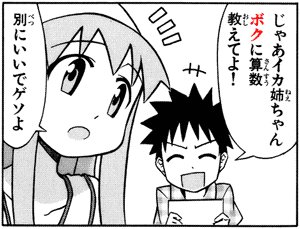
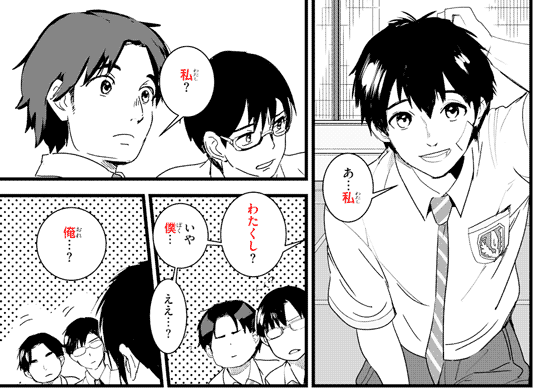
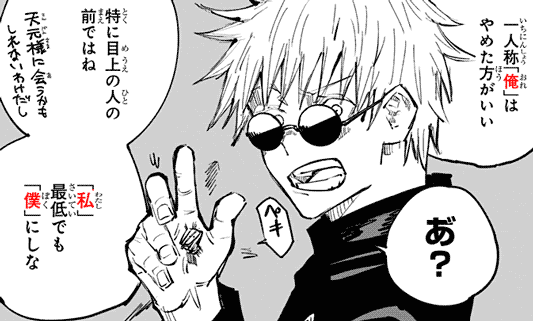
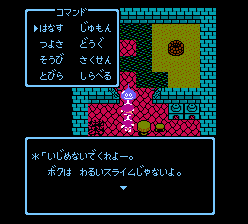
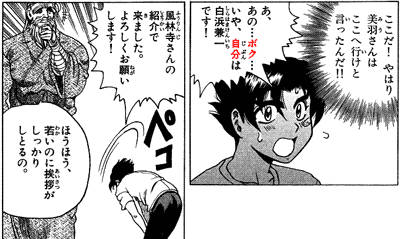
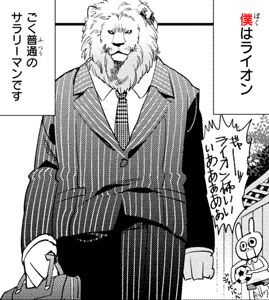
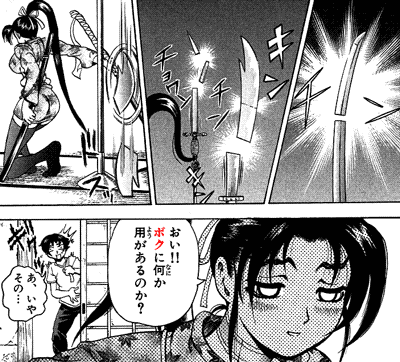
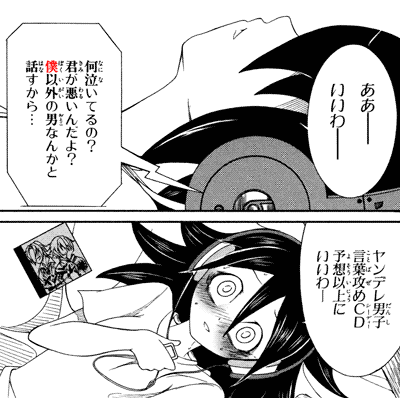

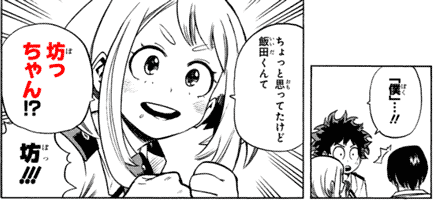
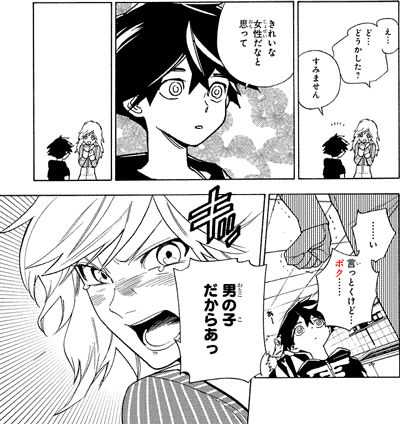
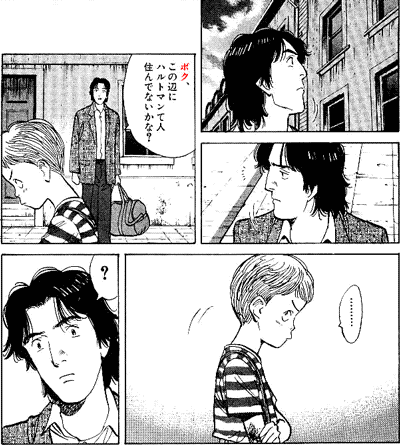
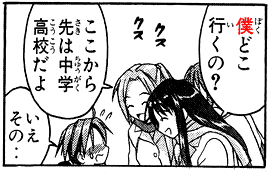
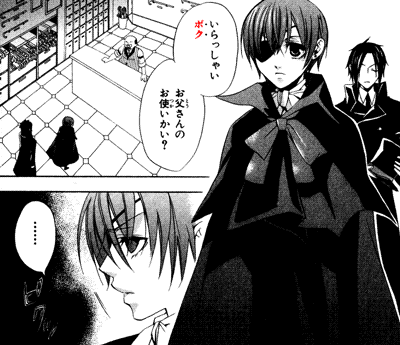
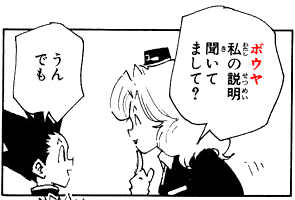
No comments: